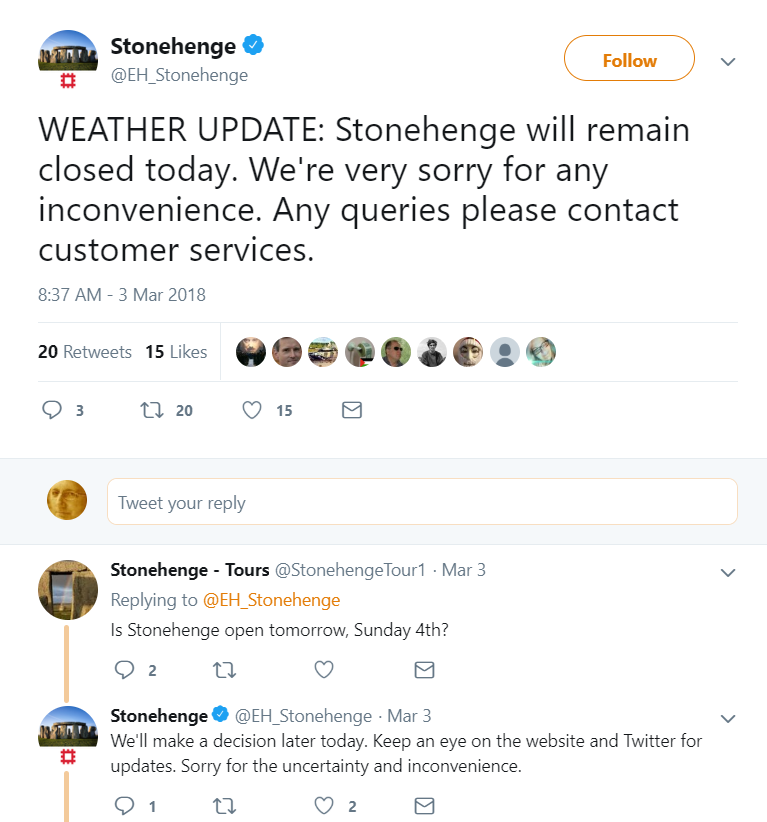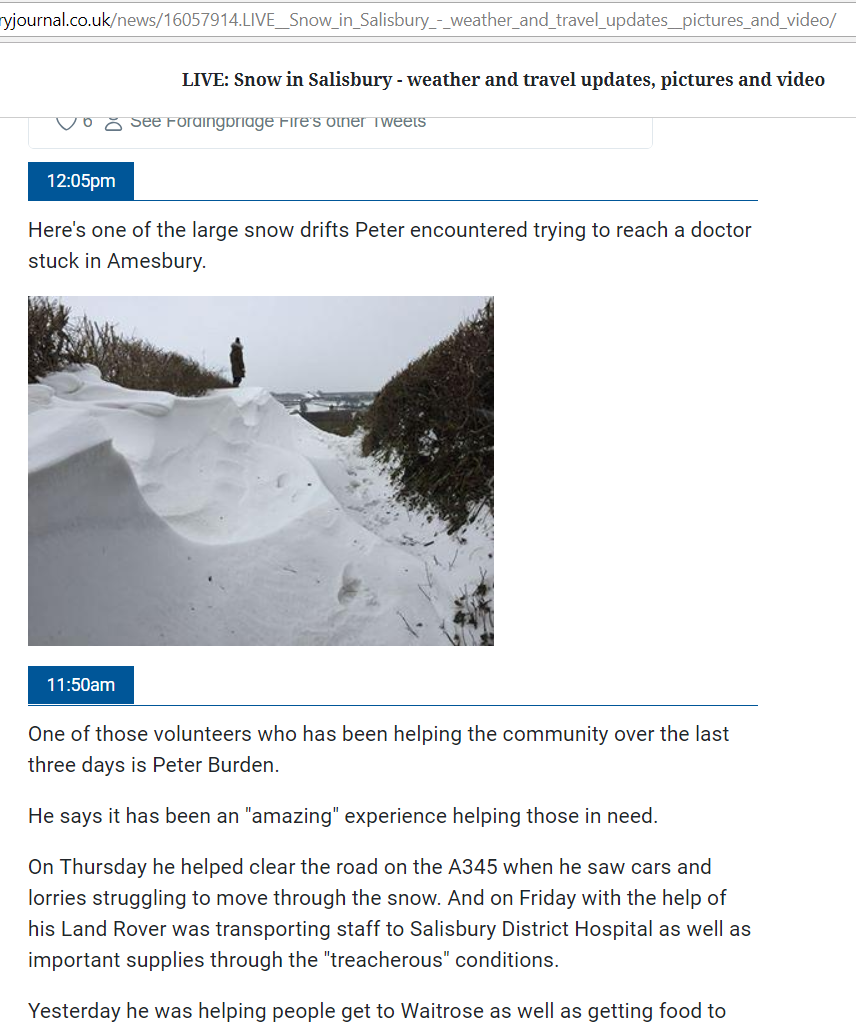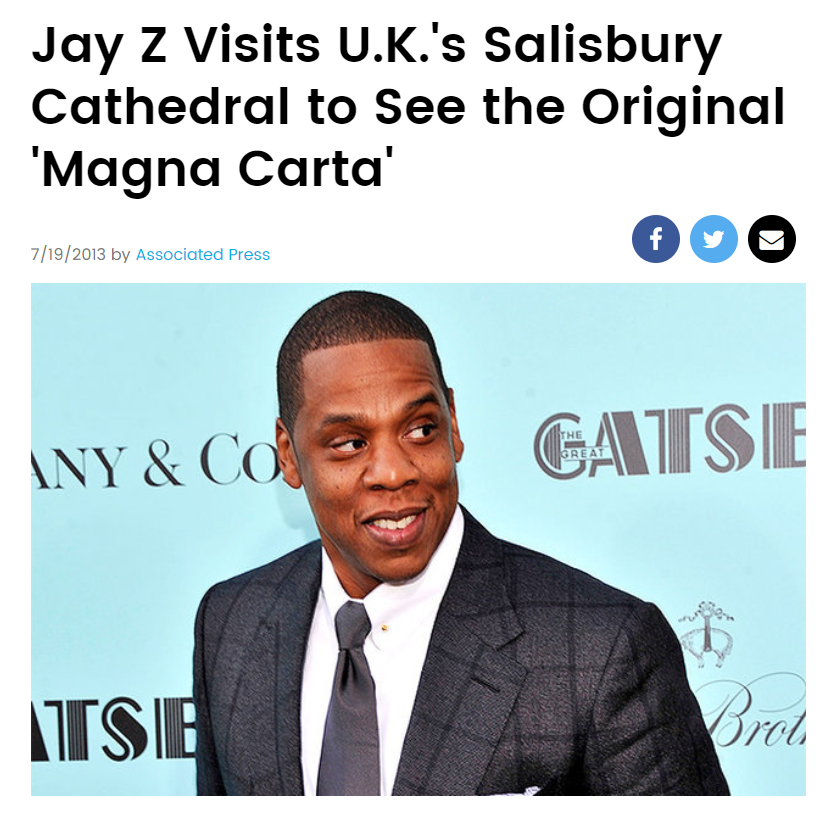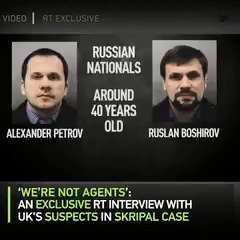13 September, 2018
Like many, my first thought at the interview of Boshirov and Petrov – which apparently are indeed their names – is that they were very unconvincing. The interview itself seemed to be set up around a cramped table with a poor camera and lighting, and the interviewer seemed pretty hopeless at asking probing questions that would shed any real light.
I had in fact decided that their story was highly improbable, until I started seeing the storm of twitter posting, much of it from mainstream media journalists, which stated that individual things were impossible which were, in fact, not impossible at all.
The first and most obvious regards the weather on 3 and 4 March. It is in fact absolutely true that, if the two had gone down to Salisbury on 3 March with the intention of going to Stonehenge, they would have been unable to get there because of the snow. It is therefore perfectly possible that they went back the next day to try again; and public transport out of Salisbury was still severely disrupted, and many roads closed, on 4 March. Proof of this is not at all difficult to find.

This image is from the Salisbury Journal’s liveblog on 4 March.


Those mocking the idea that the pair were blocked by snow from visiting Stonehenge have pointed to the CCTV footage of central Salisbury not showing snow on the afternoon of 4 March. Well, that is central Salisbury, it had of course been salted and cleared. Outside there were drifts.
So that part of their story in fact turns out not to be implausible as social media is making out; in fact it fits precisely with the actual facts.
The second part of their story that has brought ridicule is the notion that two Russians would fly to the UK for the weekend and try to visit Salisbury. This ridicule has been very strange to me. Weekend breaks – arrive on Friday and return on Sunday – are a standard part of the holiday industry. Why is it apparently unthinkable that Russians fly on weekend breaks as well as British people?
Even more strange is the idea that it is wildly improbable for Russian visitors to wish to visit Salisbury cathedral and Stonehenge. Salisbury Cathedral is one of the most breathtaking achievements of Norman architecture, one of the great cathedrals of Europe. It attracts a great many foreign visitors. Stonehenge is world famous and a world heritage site. I went on holiday this year and visited Wurzburg to see the Bishop’s Palace, and then the winery cooperative at Sommerach. Because somebody does not choose to spend their leisure time on a beach in Benidorm does not make them a killer. Lots of people go to Salisbury Cathedral.

There seems to be a racist motif here – Russians cannot possibly have intellectual or historical interests, or afford weekend breaks.
The final meme which has worried me is “if they went to see the cathedral, why did they visit the Skripal house?” Well, no evidence at all has been presented that they visited the Skripal house. They were captured on CCTV walking past a petrol station 500 yards away – that is the closest they have been placed to the Skripal house.
The greater mystery about these two is, if they did visit the Skripal House and paint Novichok on the doorknob, why did they afterwards walk straight past the railway station again and head into Salisbury city centre, where they were caught window shopping in a coin and souvenir shop with apparently not a care in the world, before eventually returning to the train station? It seems a very strange attitude to a getaway after an attempted murder. In truth their demeanour throughout the photographs is consistent with their tourism story.
The Russians have so far presented this pair in a very unconvincing light. But on investigation, the elements of their story which are claimed to be wildly improbable are not inconsistent with the facts.
There remains the much larger question of the timing.
The Metropolitan Police state that Boshirov and Petrov did not arrive in Salisbury until 11.48 on the day of the poisoning. That means that they could not have applied a nerve agent to the Skripals’ doorknob before noon at the earliest. But there has never been any indication that the Skripals returned to their home after noon on Sunday 4 March. If they did so, they and/or their car somehow avoided all CCTV cameras. Remember they were caught by three CCTV cameras on leaving, and Borishov and Petrov were caught frequently on CCTV on arriving.
The Skripals were next seen on CCTV at 13.30, driving down Devizes road. After that their movements were clearly witnessed or recorded until their admission to hospital.
So even if the Skripals made an “invisible” trip home before being seen on Devizes Road, that means the very latest they could have touched the doorknob is 13.15. The longest possible gap between the novichok being placed on the doorknob and the Skripals touching it would have been one hour and 15 minutes. Do you recall all those “experts” leaping in to tell us that the “ten times deadlier than VX” nerve agent was not fatal because it had degraded overnight on the doorknob? Well that cannot be true. The time between application and contact was between a minute and (at most) just over an hour on this new timeline.
In general it is worth observing that the Skripals, and poor Dawn Sturgess and Charlie Rowley, all managed to achieve almost complete CCTV invisibility in their widespread movements around Salisbury at the key times, while in contrast “Petrov and Boshirov” managed to be frequently caught in high quality all the time during their brief visit.
This is especially remarkable in the case of the Skripals’ location around noon on 4 March. The government can only maintain that they returned home at this time, as they insist they got the nerve agent from the doorknob. But why was their car so frequently caught on CCTV leaving, but not at all returning? It appears very much more probable that they came into contact with the nerve agent somewhere else, while they were out.
I shall write a further post on these timing questions shortly.
Skripal
Suspects Appear For First Time In Shocking Interview: We Are "Framed
Tourists"
13
September, 2018
The
same day the US announced it
plans a second round of "very severe" sanctions on Russia
over the use of a nerve agent in connection to the West's
allegations surrounding the Skripal poisoning, the
alleged perpetrators of the poison attack have appeared on RT News
for an exclusive interview with RT's Editor-in-Chief Margarita
Simonyan.
Suffice
it to say the whole strange Skripal saga just got a lot more bizarre.
The pair told Simonyan in the televised interview that they had
nothing to do with it, but were very excited to visit the famous
Salisbury cathedral as mere sightseers and were in the Salisbury town
briefly on two consecutive days, but
that they are not GRU agents or Russian spies.
"Our
friends had been suggesting for a long time that we visit this
wonderful town," they
said,
and explained that after the short visit, their"whole
lives were turned upside down" as they suddenly
became "framed tourists" caught up in the Skripal
cause after being falsely accused by UK authorities.
The
pair sat stone-faced throughout the
interview and
delivered brief, concise answers to RT's questions, while
consistently claiming to have been visiting Britain as tourists, but
while also acknowledging it
was indeed them that appeared in CCTV footage published by the UK
authorities.
“Salisbury?
A wonderful town?” RT's Margarita Simonyan asked. “Yes,” Petrov
answered tersely. “It is a tourist town,” Boshirov
offered. “There’s a famous cathedral there... It is famous
not just in Europe, but in the whole world. It’s famous for its
123-metre spire, it’s famous for its clock, the first one [of its
kind] ever created in the world, which is still working.”
Upon
the start of the interview wherein the two confirm their
true identities as Alexander Petrov and Ruslan Boshirov to
RT's Simonyan, the
interview proceeds:
SIMONYAN: The guys we all saw in those videos from London and Salisbury, wearing those jackets and trainers, it's you?
PETROV: Yes, it’s us.
SIMONYAN: What were you doing there?
PETROV: Our friends have been suggesting for quite a long time that we visit this wonderful city.
SIMONYAN: Salisbury? A wonderful city?
PETROV: Yes.
SIMONYAN: What makes it so wonderful?
BOSHIROV: It’s a tourist city. They have a famous cathedral there, Salisbury Cathedral. It’s famous throughout Europe and, in fact, throughout the world, I think. It’s famous for its 123-meter spire. It’s famous for its clock. It’s one of the oldest working clocks in the world.
Petrov
then explains that the pair planned to visit famous tourist sites in
London and in and around Salisbury, but parts of their trip were cut
short because of heavy snowfall and inclement weather.
The
pair say they only spent three days total in England, due their
decision to cut it short, but were in Salisbury for some of that
time, on two consecutive days:
SIMONYAN: So, you travelled to Salisbury to see the clock?
PETROV: No, initially we planned to go to London and have some fun there. This time, it wasn’t a business trip. Our plan was to spend some time in London and then to visit Salisbury. Of course, we wanted to do it all in one day. But when we got there, our plane couldn't land on its first approach. That’s because of all the havoc they had with transport in the UK on March 2 and 3. There was heavy snowfall, nearly all the cities were paralyzed. We were unable to go anywhere.
BOSHIROV: It was in all the news. Railroads didn't work on March 2 and 3. Motorways were closed. Police cars and ambulances blocked off highways. There was no traffic at all – no trains, nothing. Why is it that nobody talks about any of this?
SIMONYAN: Can you give a time line? Minute-by-minute, or at least hour-by-hour, or as much as you can remember. You arrived in the UK – like you said, to have some fun and to see the cathedral, to see some clock in Salisbury. Can you tell us what you did in the UK? You spent two days there, right?
PETROV: Actually, three.
SIMONYAN: OK, three. What did you do for those three days?
PETROV: We arrived on March 2. We went to the train station to check the schedule, to see where we could go.
BOSHIROV: The initial plan was to go there for a day. Just take a look and return the same day.
PETROV: To Salisbury, that is. One day in Salisbury is enough. There’s not much you can do there.
BOSHIROV: It’s a regular city. A regular tourist city.
SIMONYAN: OK, I get that. That was your plan. But what did you actually do? You arrived. There was heavy snowfall. No trains, nothing. So, what did you do?
PETROV: No, we arrived in Salisbury on March 3. We wanted to walk around the city but since the whole city was covered with snow, we spent only 30 minutes there. We were all wet.
In
comments that will likely be able to be easily proven or disproven,
he followed with: "There are no pictures. The media,
television – nobody talks about the fact that the transport system
was paralyzed that day. It
was impossible to get anywhere because of the snow. We were drenched
up to our knees."
In
Salisbury, Petrov continued, the two intended "to see
Stonehenge, Old Sarum, and the Cathedral of the Blessed Virgin Mary.
But it didn’t work out because of the slush." But they blame
the harsh conditions for quickly canceling their plans and "transport
collapse", and they returned the train station after their
initial arrival in the town via train from London.
SIMONYAN: All right. You went for a walk for 30 minutes, you got wet. What next?
PETROV: We travelled there to see Stonehenge, Old Sarum, and the Cathedral of the Blessed Virgin Mary. But it didn’t work out because of the slush. The whole city was covered with slush. We got wet, so we went back to the train station and took the first train to go back. We spent about 40 minutes in a coffee shop at the train station.
BOSHIROV: Drinking coffee. A hot drink because we were drenched.
PETROV: Maybe a little over an hour. That’s because of large intervals between trains. I think this was because of the snowfall. We went back to London and continued with our journey.
BOSHIROV: We walked around London…
SIMONYAN: So, you only spent an hour in Salisbury?
PETROV: On March 3? Yes. That’s because it was impossible to get anywhere.
SIMONYAN: What about the next day?
PETROV: On March 4, we went back there, because the snow melted in London, it was warm.
BOSHIROV: It was sunny.
PETROV: And we thought – we really wanted to see Old Sarum and the cathedral. So we decided to give it another try on March 4.
SIMONYAN: Another try to do what?
PETROV: To go sightseeing.
BOSHIROV: To see this famous cathedral. To visit Old Sarum.
SIMONYAN: So, did you see it?
BOSHIROV: Yes, we did.
PETROV: On March 4, we did. But again, by lunchtime, there was heavy sleet.
BOSHIROV: For some reason, nobody talks about this.
PETROV: So we left early.
In
total, the
pair say they spent only an hour on their first day
in Salisbury "because
it was impossible to get anywhere," before taking a train
back to London. The
men say this all happened on March 3rd, the day before the alleged
poisoning of Sergei Skripal,
a former Russian military officer and double agent for the UK's
intelligence services, and his daughter Yulia Skripal, in the same
town.
However,
they say they
returned to sightsee in Salisbury the next day, March 4,
on the day of the Skripal attack.
And
continuing, RT's Simonyan asked them to divulge proof that they
took photographs of the sites. The pair agreed they would provide
their tourist photographs to the media as proof of their story.
SIMONYAN: Is it beautiful?
BOSHIROV: The cathedral is very beautiful. There are lots of tourists, lots of Russian tourists, lots of Russian-speaking tourists.
PETROV: By the way, they should have a lot of pictures from the cathedral.
SIMONYAN: Your pictures, you mean?
PETROV: They should show them.
SIMONYAN: I assume you took some pictures while at the cathedral?
PETROV: Of course.
BOSHIROV: Sure, we did. We went to a park, we had some coffee. We went to a coffee shop. We walked around, enjoying those beautiful English Gothic buildings.
PETROV: For some reason, they don’t show this. They only show how we went to the train station.
SIMONYAN: If you give us your pictures, we can show them. So, while you were in Salisbury, did you go anywhere near the Skripals home?
PETROV: Maybe. We don’t know.
BOSHIROV: What about you? Do you know where their house is?
SIMONYAN: I don’t. Do you?
BOSHIROV: We don't either.
PETROV: I wish somebody told us where it was.
And
Boshirov added after the series of questions concerning the Skripal
residence: "Maybe
we passed it, or maybe we didn’t. I’d never heard about them
before this nightmare started. I’d never heard this name before. I
didn’t know anything about them."
On
the issue of the alleged "perfume bottle" the UK
police claim to have identified as used for delivery of the nerve
agent, the two accused men said the prospect is "absurd".
SIMONYAN: When you arrived in the UK, when you were in London or in Salisbury, throughout your whole trip, did you have any Novichok or some other poisonous agent or dangerous substance with you?
BOSHIROV: No.
PETROV: It’s absurd.
SIMONYAN: Did you have that bottle of Nina Ricci perfume which the UK presents as evidence of your alleged crime?
BOSHIROV: Don’t you think that it’s kind of stupid for two straight men to be carrying perfume for ladies? When you go through customs, they check all your belongings. So, if we had anything suspicious, they would definitely have questions. Why would a man have women's perfume in his bag?
PETROV: Even an ordinary person would have questions. Why would a man need perfume for women?
And
on the issue of the widely circulated and somewhat mysterious
(considering the same exact time stamp for each) security camera
photographs at Gatwick airport...
SIMONYAN: Right. Here’s the photo that’s got the whole world puzzled. Gatwick. You’re going through the gate at the same time, even at the same second. How do you explain that?
BOSHIROV: I think it’s for them to explain.
PETROV: How can we explain it?
CCTV
images of Petrov and Boshirov at Gatwick airport on 2 March 2018.
BOSHIROV: We always go through the gate together. Through the same gate, with the same customs officer. One after another. We walked through that corridor together. We’re always together. As to how it happened – us walking there at the same second and then separately – I think it’s a question that should be put to them.
PETROV: Yeah, on the point of us always going through it together – my English is a bit better, so if any problem crops up, I’m there to help Ruslan out.
SIMONYAN: So you went through together? You didn’t take different corridors?
PETROV: No, we never go through separately.
BOSHIROV: No, never.
SIMONYAN: So what about these photos then? You say it never happened? Or were they doctored?
BOSHIROV: Well, I don’t really know…
PETROV: It’d be a good thing if we could actually remember it…
BOSHIROV: … how they do these things over there. When you arrive at an airport, or leave one, when you go somewhere or other, you never think about the cameras… There’s nothing interesting about them. How they film, or what, or where – I’m not interested in any of that and so I never took any notice. Given that it was them who published these photos with this time on them and all, I think the best thing to do would be to ask them.
Near
the end of the interview, the two men explicitly
denied working for GRU and
demanded a formal apology from the UK government over the whole
gambit of accusations.
But
when pressed further about how they know each other and their past,
said they preferred not give too many public details about their
lives, but explained they worked as part of a fitness nutrition
supplements business.
Simonyan
Sniffs Out the Spies! What Do You Know, Turns Out Someone Was Lying..







No comments:
Post a Comment
Note: only a member of this blog may post a comment.